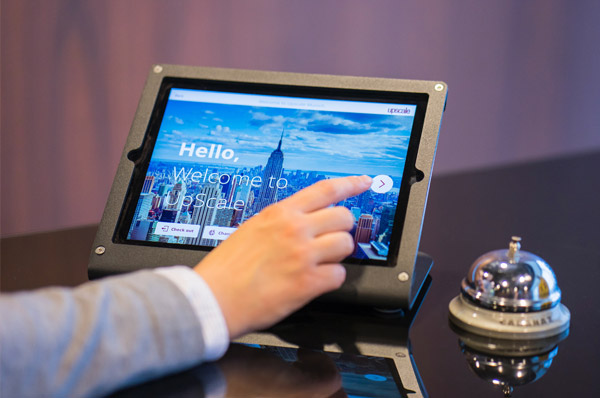Satisfaction with hotel stays has dipped only slightly compared to 2019, according to an extensive review of online customer sentiment.
Out of five global regions, North America saw the largest decline in guest satisfaction during 2022, the Shiji ReviewPro report says, with guests at three-star hotels reporting the biggest falls.
Labour is a central concern for hotel owners and operators, the report found. Do they need to reinstate full labour and service? Despite offering incentives, hotels are still experiencing staffing shortages. So, will guests generally accept a more pared-down service in the post-pandemic era?
 It’s an issue where technology is widely touted as the solution to both staff shortages and guest expectations of a smooth and enjoyable experience.
It’s an issue where technology is widely touted as the solution to both staff shortages and guest expectations of a smooth and enjoyable experience.
Yet, according to a recent Hilton survey of 7,000 travellers, only 26 per cent believed that technology was important for them to have a seamless stay.
The same survey found almost nine out of ten wanted some kind of personalisation during their stays, such as being greeted by name or receiving a reservation recommendation.
These two findings appear somewhat contradictory. Although the guest may not be aware of it, a global brand needs an effective guest data system to greet guests by name or make personal recommendations at scale.
Hilton’s EVP and CCO, Chris Silcock, said: “People are seeking a balance between technology and human interaction. A lot of companies talk about digitizing the human experience. But we come at it from a slightly different angle, which is how to humanize the digital experience.”
He added: “Despite our increasingly digital world, travellers are still looking for human connections, experiences and solutions that make them feel truly cared for. People are searching for the most convenient but also the most logical solutions to their problems.”
Making the right investment choice
With pressure to upgrade hotel tech on several fronts – door locks, phone systems, on-premise PMSs, CRM systems – the last thing hotel owners want to do is waste money on investments that are either unwanted or under-utilised.
Fred Novella, managing director, Global Asset Solutions, said tech investment requires great scrutiny and could be a source of tension between owners and operators.“The cost of implementation is often overlooked and the time it takes to integrate each software into the current hotel tech eco-system. Owners are paying and they often don’t have a choice even though they know some software is not the best,” he said.
“Should the operator pay for this software? And once implemented, does the operations team use it? Not always. Do they know how to use it and keep training the team? Not always.”
A key goal of tech upgrades is to facilitate a contactless guest experience in which the hotel guest can do almost everything (check-in, check-out, booking ancillary services, chat, enter room, pay) from her mobile phone.
But owners may need to unbundle such services and choose what is appropriate and what is not. For example, several hotel brands including Hilton, have championed investment in digital keys, although take-up by guests remains low.
Digital entry to extended stay or student accommodation (which may be unstaffed) makes absolute sense; guests at a hotel for one or two nights often prefer a plastic swipe key.
Heather Byron, SVP of services at Alliants, said it is important for hotels to study and identify the various personas of their guests: a single woman on business; a couple on a weekend break; a family with two young children; a family with teenage children etc. In this way, the hotel can measure the importance of digital guest journey tech to its audience, and this can influence tech investment decisions.
“Retirees on a long golf weekend don’t want to use to use technology or a messaging platform. They want to chat with someone in person,” she said. “If I’m staying alone for business, I’ll probably go down to reception too, but if I’m with my kids and I want to know when the pool is open, it’s just more convenient to quickly fire off a WhatsApp message.”
Tech-first model
Mollie’s, the UK motel and diner brand created by Soho House, has targeted a tech savvy demographic and designed a tech-first operating model, with the option of a non-digital experience.
With upscale hotel brands, service is still in-person first, with a digital choice too, said Byron. But the typical luxury guest is changing, and take-up of digital guest services is set to increase due to a demographic shift.
During IHIF 2023, Marc Socker, CEO, Maybourne Hotel Group, highlighted that luxury consumers are getting younger and 50% are now under the age of 35. Wealthy Chinese citizens saved the equivalent of the UK’s GDP during COVID-19, and they are about to start travelling outside Asia Pacific again.He added that luxury is about human connections and strong emotional connections between staff and guests across generations and technology is an enabler that supports a hotel’s heritage.
The rapidly growing spending power of digital natives is coinciding with the rise of generative AI which can help deliver predictive rather than reactive service.
Hotel guests typically request restaurant reservations and spa treatments on the same day or the day before which often leads to disappointment. However, by sending an AI-powered personalised choice of activities, venues and experiences in the destination to a guest’s phone prior to arrival, guests can be encouraged to plan and book their stays in advance.
In another example, when a cancellation occurs at a golf resort with limited time to resell the slot, an AI-powered bot could automatically send an invitation to everyone in the resort.
In general, generative AI will improve automated processes that stem from a single event. So, when a cancellation occurs, it can trigger a series of actions that minimise revenue loss and enhance the experience for other guests.
Hotels possess valuable customer data but they do not always know what to do with it. Generative AI is increasingly showing the way forward, said Byron: “It’s not about replacing service. It’s about freeing up time so hotel staff can really focus on the in-person moments that matter.”
Novella predicted that due to staff shortages, automation will play an increasing role in the midscale segment. In the upscale segment, guests will still have the luxury of in-person service, while behind the scenes AI-driven intelligence will help hotels deliver predictive service and hyper-personalisation.
Post
Portugal Hotel Market Outlook 2024
PORTUGAL’S HOSPITALITY INDUSTRY is experiencing an impressive comeback post…
Post
Know thyself for budget success
“Before you can budget for the year ahead, it is critical that you assess the…
Post
Should hotels refuse to join a club which would have them?
The current battleground for the big hotel chains is not pipelines, but loyalty…
Post
The digital concierge: how can hotels use technology to maximise revenue and customer experience?
More than half of all business trips are now a mix business and leisure – so…
Post
Spanish Hotel Market 2024
SPAIN’S TOURISM SECTOR in 2023 exceeded all initial expectations and surpassed…
Post
Balancing the scale of luxury
Tell someone in the sector your hot new tip is luxury growth and you’ll lose…
Post
The luxury sustainability conundrum
Climate change is one of the most significant challenges society is facing, but…
Post
Failing the AI tech race
Attend any conference over the past decade, and a common theme is the devilish…
Post
From compound stays to compound interest
Back in the days of yore - or, for those who measure time this way -…
Post
Projecting into an AI future
The world of hospitality has seen remarkable changes over the past few decades,…
Post
Bringing strength to soft brands
‘Another day, another brand’ could well be the catchphrase of our sector, but…
Post
The need for CAPEX and creating returns
As an asset manager, it’s my job to create and manage the relationship between…
Post
Budgeting for change pt.2
In the second of our series on the budget approval process, we are looking at…
Post
Budgeting for change pt.1
Each season brings with it change and, depending on the time of year, the…

